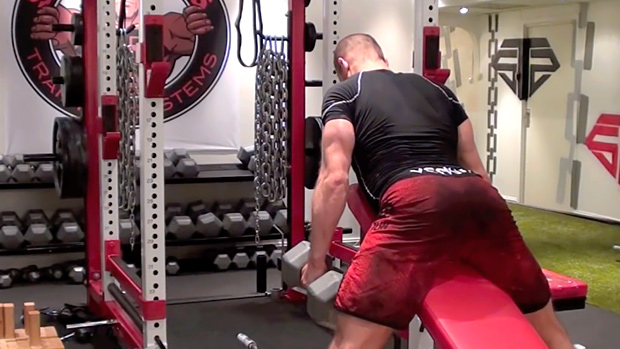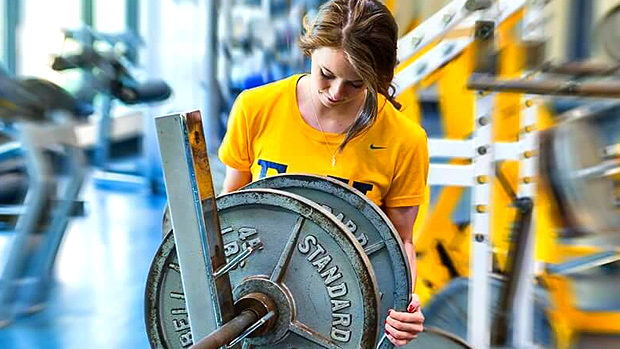This is Lucky 13, a rapid fire Q & A session with a training or nutrition expert who matters. It's fast, furious, and to the point.
In previous installments, we've talked to Chad Waterbury, Christian Thibaudeau, John Berardi, and Lonnie Lowery. Today we sat down with Alwyn Cosgrove, outspoken fitness and performance coach. Aren't you lucky?
 |
Question #1: You don't really like being called a "strength coach." Why?
Alwyn Cosgrove: Because it's a fucking stupid term. It implies that all I do is strength training. If that was all we did as a profession, then Louie Simmons and Dave Tate (who can get people strong) would put us all out of business.
But here's the thing: Let's say you come to me to improve performance, and let's say we have a hypothetical scale of 1-10 to measure performance. We establish that you need a strength level of 7 and you're currently at a 9, but you need a flexibility score of 5 and are currently at a 3. Well, we can improve your performance the most by working on the flexibility portion. Does that make me a flexibility coach then?
I believe in improving performance for athletes, and health and aesthetics for general population clients. I use the most effective method possible whenever I do that. Often it means strength training, but sometimes it means speed work or agility or endurance.
There's also a difference between a "specialist" like myself and a real coach. There are typically four or five coaches on a football team at college level. However, for all sports there might be one strength coach. My good friend Robert Dos Remedios, strength and conditioning coach at College of The Canyons, trains 97 football players at a time. That's a coach. Working with two or three people at a time like most of the rest of us do is easy by comparison.
Question #2: Your wife is a trainer, former cheerleader, fitness competitor, and all around babe. You're an ugly fuck. How'd you manage that?
 |
Rachel Cosgrove, clearly too pretty for Alwyn.
Cosgrove: The sun even shines on a dog's ass some days, right? I had no money either when we got together, so it wasn't that!
Here's my secret picking-up-girls move: I pretended I was Scottish and used a heavy accent to fool her. Accents work on California girls! When she figures out I'm really from Brooklyn, I'm fucked.
Everyone who meets me and Rach are always like, "Are you fucking kidding me? How did this happen?" To be honest, I'm not so sure myself. I'm dead sexy. (The last sentence must be read in the same voice as Fat Bastard from Austin Powers).
Question #3: Many readers don't know this, but you recently won a battle with cancer. That has to put things into perspective. Tell us about that.
Cosgrove: Yeah, when an idiot is taking shots at you on an Internet forum, or you're stuck in traffic, it really doesn't phase you at all after hearing, "You've got cancer," eh?
But no one really "wins" a battle with cancer. You're either fighting cancer or you're in remission – which means you're still fighting cancer but you have a big lead on the scorecards. I'm in remission, which means I'm still fighting.
The first symptom I had was I started getting really fat. Weird. Typically cancer patients lose weight, so nothing really clicked as being wrong. I guess the weight gain was a combination of inflammation, tumor growth, and massive tiredness (meaning I moved less). Then I got the night sweats. Then I found a lump in my thigh...
Incidentally, Lance Armstrong had three types of cancer – testicular, brain and lung – at the same time, all in stage four. So I can't complain at all. Actually, it kind of spoils my story when I only have one and don't really have any plans of winning the Tour De France seven times!
 |
I also had a bone marrow sample drawn. Guys, listen. We all think that getting kicked in the balls is the worst pain possible. It's not. Getting kicked in the balls for ten minutes straight is worse, and that's pretty much what a bone marrow sample feels like. They can't numb a bone, so the specialist basically drills through your hip and into the bone marrow before sucking out a big chunk. It hurt like fuck.
So I got six months of chemotherapy. For those that don't really know what that means, chemotherapy is basically drugs that will kill you, injected into your veins. They back it off a little bit so you just feel like shit (instead of dying) and stop it once the cancer cells die first.
I was announced in remission in March 2005. I just had a check-up--yesterday actually, and everything is still good. Scariest time of my life though. It changes everything.
What's interesting is (and I've thought about this a lot) if I were to be asked to choose a friend or family member who had to get cancer and could beat it, I'd choose me. I'm the toughest guy I know! [laughing]
Question #4: You're a former martial arts champ. What other person in this biz would you like to get into the ring with?
Cosgrove: After question number two, I think I'd like to fight Chris Shugart. Watch out for me at future seminars, bitch!
Nah, no one really. In order to want to fight someone, they'd have to have pissed me off. And you'd have to be really special to be able to piss me off.
 |
Question #5: What's the biggest criticism you get and what's your response to it?
Cosgrove: I don't respond. To answer your question though, I guess it would be that I'm not 275 pounds and jacked, nor am I 175 pounds at 2% body fat. (For the record, I'm about 210 at about 12%-ish right now.) But how can you possibly be good at training people if you're not at one of those extremes, right? But after cancer it's not even a goal of mine.
What was funny though was after we did the first T-Nation interview I looked at the pics and thought, "Wow, I look kind of chunky." And someone on the forum said I looked like I barely filled out a medium shirt. Ha! You can't win.
As you've said a few times, if you post a picture and you're 5% body fat you'll get slammed for being "scrawny,"and if you're 275 you'll get slammed for using steroids! From the same fucking critic!
Question #6: At your facility you train top athletes as well as regular people just wanting to get into shape. I'm sure there are a lot of differences in their training, but what's the same? Is there overlap?
Cosgrove: More than most people would realize. The main difference is psychology. You tend to need to pull an athlete back to do less, and push a "regular" person to do more. The exercises don't change too much – everyone squats, everyone pulls. Obviously the loads change, but to be honest, the relative intensity doesn't change too much.
The programs are actually closer than you'd think. I evaluate people. I design programs based on their goals and the unique "blueprint" that they present to me. The fact that they're an athlete or not, or even what sport they play, plays a very small role in my program design.
 |
Question #7: You mentioned to me before that most people training to lose fat are going about it the wrong way; often, they're copying athletes whose fat loss is a side effect of their training, not the primary goal. Explain that.
Cosgrove: This type of programming is actually a new concept to be honest; it just wasn't needed in the past. People were leaner. People moved more. Now in an almost completely automated, time-crunched society, we've had to create exercise programs specifically to induce fat loss.
Despite the overwhelming amount of research on aerobic training and exercise for health, none of it had the goal of fat loss. In fact, the very thought of training solely to produce a loss of fat was an alien concept just a few years ago.
And the fitness industry has failed. We recognized the need to create fat loss programs; we just didn't know where to start. We originally designed fat loss programs by copying what endurance athletes were doing and hoping that somehow the training program of a marathon runner would work for fat loss for an obese lady, even when we cut it down to 20 minutes, three times per week. But fat loss was never the goal of an endurance athlete – it was a side effect.
Then the fitness industry turned to bodybuilding for ideas. This was the height of the Body-for-Life physique transformation contests. And we failed again. To take the programs of drug-using, fulltime, professional, genetic freak bodybuilders and use them to model fat loss programs for the general population was nonsensical.
But we tried. We failed again. But we were getting closer. Fat loss was a goal for bodybuilders at least, but the low levels of body fat percentage a contest bodybuilder achieved was largely a result of their increased muscle mass and therefore their metabolism.
 |
It's my belief that before we start to program fat loss, we have to understand exactly how it occurs. Then we design a program based on those principles. Despite advances in the methods of training, the fitness industry has yet to truly provide a complete fat loss solution.
For fat loss we need to observe the following as our primary goal:
• Burn as many calories as possible through resting metabolic rate. Lean muscle is metabolically active, so building muscle or at least maintaining it is extremely important.
• Burn more calories through increased meal frequency (digestion burns calories).
• Burn more calories through macronutrient manipulation. The thermic effect of protein is twice as high as the thermic effect of fat or carbohydrate – and it adds up.
• Burn calories through metabolic disturbance (increased activity levels and EPOC, or excess post-exercise oxygen consumption).
• Create a deficit between the metabolism (calories burned) and intake (calories consumed). This deficit can only be closed by "borrowing" from the body's energy stores – i.e. your body fat.
I thought the recent Fasted Cardio Roundtable was interesting. What the authors forgot to say was that steady state aerobic training is probably the least efficient way of causing fat loss in the first place! It contributes very little to the above criteria beyond calories burned. It's a popular topic, but it's minutiae (TC's favorite term!)
Question #8: What the hell kind of name is "Alwyn?" How many times a day do you have to tell people that it's pronounced "Alan?"
Cosgrove: First of all, it's pronounced "All-in" – slightly different from "Alan," although with your Texas drawl it'll sound the same!
Anyway, you have no idea. Do you see the link between your parents giving you some fucked up name, playground hassle, and becoming a first degree black belt at fourteen?
It's some old Scottish/Welsh name. I think it means "almighty sex god" or something.
Question #9: Many strength and conditioning pros are called "sellouts" if they lower themselves by helping average people and non-athlete beginners. Fair criticism or unfair, pissy criticism?
Cosgrove: Completely unfair criticism. Do you want to know the difference between a professional strength & conditioning coach to an athlete and a top personal trainer? Opportunity.
And to be honest, there are trainers out there working in clubs getting people in shape everyday, putting food on their table as a result of getting good results, who have more successful track records than some well known names in the industry.
It amazes me to see strength coaches list all the athletes that have won medals at World Championships. Where's the list of all the guys who didn't win shit? You trained them too! If you want the credit for successes, take the blame for the failures. (Ian King said that, I think.)
Question #10: Any hobbies or interests outside of training?
Cosgrove: I love boxing. Love it! I spend far too much on pay-per-view boxing and am a bit of a geek when it comes to the fights. I watch the Spanish channel every week to see the fights with the young, up and coming Mexican fighters. Can't speak Spanish at all, by the way.
I'm also a comic book geek. The new Ultimate line from Marvel comics is awesome. Other than that, I read a lot. I spend about $150 a week on books. Get me in a bookstore and I'm like a little kid in a candy store.
 |
Question #11: The average T-Nation reader is more experienced and knowledgeable than the typical gym rat. But now that you've interacted with them in our Locker Room, what generalization can you make about where many are going wrong in their weight training?
Cosgrove: Most guys don't give a thought to long term programming. They think a program is a workout or a four week routine. Real programming is a long term process.
And despite me talking about it at length, the average reader is still on some sort of "body part split." Body part splits appeared at the same time as drug use increased in bodybuilding. A drug-free guy with a job and any kind of life outside the gym will make better progress long term using full body routines or movement pattern splits.
There's also a tendency for them to compare different authors' approaches to training/nutrition and focus on the differences. If they focused on the similarities, they'd realize that 80-90% of what we're all saying is the same. And that's where the real information is.
T-Nation readers are smart, but they're still trapped in tradition. Question everything. Why do split routines? Why do aerobics for fat loss? Why static stretch? Most of the time, guys haven't thought about these things.
Question #12: Now for the question that's become a Lucky 13 tradition. If you could nail any woman in the world, who would it be?
Cosgrove: I had stage IV cancer. I spent six months of my life hooked up to IVs puking my guts out. I really put the marriage vows to the test, because that wasn't what we meant by "in sickness and in health," you know?
What did Rach do? She completed a triathlon and raised a shitload of money for cancer research, was voted most inspirational on her team, and this year has become one of the coaches for Team In Training. My wife is an unbelievable person. I moved halfway around the world to be with her. There's no one else. Sorry if that's not a manly enough answer.
 |
Question #13: Sounds good to us. Where can T-Nation readers go to find out more about you and your programs?
Cosgrove: I have my own website (www.alwyncosgrove.com) and a pretty cool newsletter that people can sign up for. I also have a mainstream book coming out next year with Lou Schuler called The New Rules of Lifting.
 |
Wrap-up
Thirteen questions, thirteen answers, zero bullshit. Done!




